Shane Jiraiya Cummings - the sharp end of horror
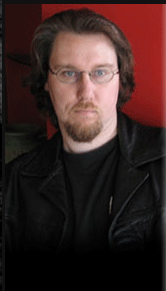
Attempting to paraphrase Shane Jiraiya Cummings' career thus far is akin to trying to hold back a tsunami with a dyke made of straw. You can give it a
bloody good attempt but ultimately you are not going to be able to cover the deluge. My full apologises to the Writer and the horror community if I
miss something in this preamble to the interview.
Shane is a multiple, amongst every other award available Down Under, Ditmar winner who has founded a number of influential dark fiction publications,
and who is a leading light in the speculative fiction community in Australia and New Zealand.
Besides writing up a storm, Shane has over sixty stories published in Australia, the U.S, and Europe, he has also edited a number of anthologies,
including Australian Dark Fantasy & Horror 2006 and the second addition of the Australian Horror Writers Association publication Midnight
Echo.
When not writing fiction Shane manages Brimstone Press, Australia's leading speculative fiction small press he helped found with Angela Challis. The
prolific, and apparently non-flagable writer is also noted reviewer and has interview leading dark genre lights such as Alice Cooper and Charlaine
Harris.
In 2009 Shane's flash fiction collection Shards was published to both critical and commercial success.
Though born and raised in the southern suburbs of Sydney, Shane Jiraiya Cummings now lives with his partner Angela in Peth, Western Australia.
Surprising he had time to have a chat with ScaryMinds, and we extend our thanks to Shane for the chance to talk to him.
ScaryMinds - When do you find time to write considering your other wide ranging activities?
Shane - The truth is, I often can't! I work a day job (as a magazine editor), which only leaves me a few hours at night to
write and edit my dark fiction projects. Most of my output occurs on the weekend. I've managed so far, but things like the housework and the garden
are often the victims (if you ever see my pool, aka the tadpole hatchery, you'll know what I mean!). The eyes and the waistline are suffering from all
this computer work, too! So in early September, I came to a tough decision - I chose to resign from my day job to concentrate on finishing novels and
some other projects that have been simmering away on the backburner. The extra time in the day will also present a good opportunity for me to regain
some of the fitness from my younger days. It's a make or break decision as I've been coasting as a writer for years now, so it's time for me to step up
and aim for wider recognition or quietly slink into the background.
ScaryMinds - Do you find working both sides of the fence, writing and editing for Brimstone et al, helps you as a writer or
does it hinder your own creative juices?
Shane - It's an absolute boon, in fact! Until I began reading the work in the slushpile, I had no idea how my own work
compared. In hindsight, I would like to think favourably, for the most part. Slush reading is a very eye-opening experience. There's a good percentage
(maybe half, maybe more) of the submissions that have dire, fundamental flaws. Often, these flaws are as basic as spelling and grammar. In fact, there
are surprisingly few writers out there - including many multi-published small press darlings - who really have a solid grasp on grammar and punctuation.
It strikes me that a lot of writers think storytelling is enough. These writers don't seem to want to fully embrace their craft and it shows. Doctors,
architects, or solicitors train for years before they can begin their professions. Just because formal qualifications aren't strictly necessary for a
writing career doesn't mean writers shouldn't invest in their profession by learning the basic rules and conventions of the craft.
I've heard some aspiring writers say that they worry that their story ideas will get stolen by editors when they submit them for publication. I can
honestly say that I've never skimmed the slushpile for this kind of inspiration and I don't know any other editors who do, either. I think a lot of
new writers retread old tropes and old ground. There really aren't any new ideas these days, just new interpretations, but I don't want to paint too
harsh a picture. Some of the stories I've published (or seen published) are truly inspiring. I've never felt the need to poach the ideas therein, but
I have felt a grudging admiration, I guess, at how the author has used familiar tropes in new and surprising ways.
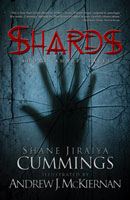
ScaryMinds - Your recent book Shards had been released to critical acclaim, do you think this will to some extent
influence your future writing or do your tales of the macabre naturally find their own length?
Shane - In many ways, Shards was a retrospective. Much of my earliest work was at the flash fiction length (below 1000
words), and flash fiction has proven to be an invaluable sandbox of ideas and styles for me. Some of those stories (even the published ones) didn't
achieve what I wanted of them, but several more surprised me with their rawness, their power, or the insinuation of grandness, despite the brevity. Now
that I've tried flash stories of all different styles, lengths (from just a few words all the way up to 1000 words), and purposes, I think it is time
for me to move forward and experiment with longer works.
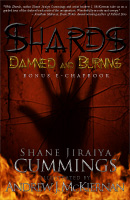 I've always allowed my stories to find their own natural length. Some started grand but ended up as flash, whereas others were written to a brief but
ballooned out from there. A good example is my novella "Requiem for the Burning God" in David Conyers' upcoming anthology Cthulhu's Dark Cults. It was
meant to be a short story of 5000 words, but 18,000 words and several months later, the story became a mini-epic. Ideas dictate the size of a story,
and the more experienced a writer is, the better they will be at matching their ideas with projected story lengths. I think I'm getting there!
I've always allowed my stories to find their own natural length. Some started grand but ended up as flash, whereas others were written to a brief but
ballooned out from there. A good example is my novella "Requiem for the Burning God" in David Conyers' upcoming anthology Cthulhu's Dark Cults. It was
meant to be a short story of 5000 words, but 18,000 words and several months later, the story became a mini-epic. Ideas dictate the size of a story,
and the more experienced a writer is, the better they will be at matching their ideas with projected story lengths. I think I'm getting there!
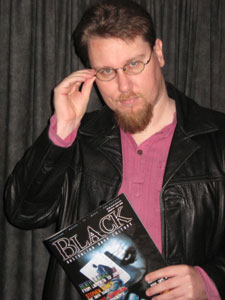
ScaryMinds - Speaking of Shards can we expect a second volume of Shane Jiraiya Cummings flash fiction in the
future?
Shane - If I'm honest with myself, the answer is 'no'. Flash fiction is a love of mine, but it also represents a period in my
development as a writer where I was experimenting with the form and with my ability as a storyteller. Shards had a natural development. For some time,
I wanted my first short story collection to be In the Heart of Midnight, which will be a showcase of what I consider my best and most successful
stories (the collection, which is yet to be published, will contain two novellas, plus stories that appeared in pro and semi-pro publications and
year's best anthologies). However, when assessing my better stories, a solid cluster of flash fiction stood out. A lot of this flash fiction was
published overseas, so I thought these stories would be best collected together in a strongly themed local edition. Thus, Shards was born. I
can now point to it with pride and say that it represents my best flash fiction, probably in the same way that I'll point to In the Heart of Midnight
once it is published and say it represents my best work at the short story through to novella range. It just made sense to have two volumes of my
short work rather than one cumbersome volume.
I love flash fiction and I love short stories, but now is the time for me to forge a career as a novelist. While writing novels, I can see myself
keeping a hand in with the short stuff (I have several good ideas and works in progress that I'd like to finish). I'm not done with short stories,
but my output is unlikely to be as prolific as it was from 2004-2006.
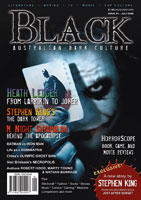
ScaryMinds - Will the delivery, via the internet, of Flash fiction as a viable story medium affect the Australian speculative
fiction scene or will it be business as usual with flash another jewel in the crown?
Shane - Sadly, I think we've seen what I term the 'Australian flash fiction bubble' of the mid-naughties expand and then
contract. I'm writing an article about the phenomenon, in fact. Early 2006 was perhaps the peak of the Australian flash fiction bubble. Antipodean
SF was continuing to meet its monthly schedule like clockwork, Shadowed Realms had just published its special 'Redback' issue, Lee Battersby's
Pater Familias (Shadowed Realms #3) was announced as the winner of the Aurealis Award for Best Horror Short story (a first for flash fiction),
Shadow Box had been released three months earlier to very positive critical acclaim and had been nominated for WA's Tin Duck Award, Equilibrium
Books had announced plans for the FlashSpec anthology series, and plans were afoot to reprint many Shadowed Realms stories in Angela Challis'
Book of Shadows anthology later that year.
Black Box (2008), Shards (July 2009), and Shards: Damned and Burning (August 2009) have probably brought a late focus back to
flash fiction, but Brimstone Press (responsible for all three titles I just mentioned) is moving onto bigger things. If flash fiction didn't gain
wider popularity two or three years ago, unless another Australian publisher comes along with passion and money to burn on internet-based flash
fiction, I can't see flash fiction taking off now. However, we're in the emerging Twitter age, so who knows? I'd like to try my hand again at
Twitter-length fiction some time. It's tricky, but when done well, micro flash fiction can be masterful!
ScaryMinds - Do you prefer to write in one sub genre when it comes to horror or are you happy to range across various
styles?
Shane - I like to explore the darker emotions with my writing. Even when I'm writing more light-hearted fare (science fiction
or fantasy), I can't help but explore darker sides of the characters or situation. I want to delve into despair and fear with my dark fiction. Fear is
easier, of course, because it is the root of all horror fiction. Despair is harder because there's a challenge to make the story interesting and
compelling while sapping the hope of the reader. I want to explore despair because it is the opposite of hope, and because I truly believe every story
should include a glimmer of hope, I need to understand its opposite.
I keep finding myself drawn to mythology, too. My current novel works in progress are steeped in Japanese and Hindu mythology, respectively. I've
also written stories based on Egyptian, Norse, and Greek myths. Myths and legends are something of a passion of mine. But it's more than just
established cultural mythologies that interest me. I'm fascinated by personal myths, by the special magic that lingers in treasured objects and hovers
around notorious people. I'm fascinated by totem magic and talismans, black magic and the effects of faith and belief. Suffusing my stories with this
level of mythology is one of my ultimate goals.
ScaryMinds - Black magazine would appear to be absent from our shelves, is the future of the magazine as an internet
publication or can we expect to see future print editions?
Shane - As you probably saw in the first issue of Brimstone Press' Eye of Fire e-zine, Editor-in-chief Angela Challis
would like to bring back the print edition of Black magazine if there is sufficient interest. It's a tough one for me as the print edition
took a major toll on me, time and health-wise (I am the sole graphic designer, the managing editor, a contributing journalist, and part-time ad guy).
However, we learned many lessons from Black's successes and failures, so if the stars are right, it will return from the grave.
The delay with the online version is largely to do with our lack of technical skills. Getting a good (and cheap!) web guy is tough, and the
Black website is somewhat complex (it will be a high content, high traffic area). However, you'll undoubtedly hear more about Black's
status soon. In the meantime, Eye of Fire is filling the void, and the more people we can encourage to subscribe
(eye_of_fire@brimstonepress.com.au), the more likely Black will return in print.
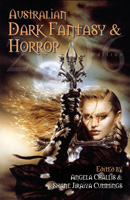
ScaryMinds - The centre of the universe for speculative writing in Australia seems to be Melbourne, how do you find things
over in the remote West?
Shane - I disagree! Melbourne has a high concentration of horror writers, to be sure, but Perth and Brisbane have
well-established enclaves of spec fic writers and fans. Perth, in particular, is blessed with a hardcore group of several hundred SF fans who attend
Swancon and related events, plus there's Angela Challis and I, and horror writers such as Martin Livings, Lee Battersby, Craig Bezant, Stephanie
Gunn, and Stephen Dedman over here, plus several successful SF authors such as K. A. Bedford and Juliet Marillier. Brisbane has the strength of the
Visions Writers Group, Fantastic Queensland (who run the Clarion South workshop), and plenty of up-and-coming writers. It must be that SF writers
enjoy the sunshine? Who knew?
Comparatively, there are more peers for me in Perth than if I lived in, say, Sydney or Adelaide, despite the geographic isolation. Having said that,
writing is by definition a lonely profession, but the internet has levelled the playing field entirely. Now, I correspond with writers in Melbourne
or USA as much as I would my peers in Perth.
ScaryMinds - Any updates you would care to share on the two book length projects our spies report you are currently
working on?
Shane - Indeed I would! My main focus at the moment is Circle of Tears, the first novel in the Adventures of
Yamabushi Kaidan series. It is Japanese fantasy based on my novelette Yamabushi Kaidan and the Smoke Dragon (from Fantastic Wonder Stories,
Ticonderoga Publications), which picked up Aurealis and Ditmar Award nominations when it was published. The first draft is almost done, and a
publisher has expressed interest in reading it, so I'm keen to finish it off and plunge into book 2 (The Clockwork Legion). The Adventures
of Yamabushi Kaidan are a pleasure to write and are filled with over-the-top heroics and typically tragic Japanese stoic love stories. The tone is
a mix of the austerity of traditional Japanese literature and way-out anime antics.
Also in my time out of the workforce, I'm hoping to complete a paranormal fiction trilogy based on Hindu mythology (book one: Ravana). It
will be darker than your typical paranormal romance, and there won't be any vampires! Hindu mythology is rife with creepy and compelling supernatural
menaces, and I'll be drawing on them extensively.
Aside from these novels, I'm hoping to complete a final story for my full-length collection In the Heart of Midnight, and I'm looking to
dabble with my latest passion: comic book scripts. The comics thing is a bit out of left field, but we'll see where it takes me.
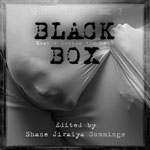
ScaryMinds - Whats the Cummings working day like, do you have a set number of pages you like to write each day, have a set
schedule you adhere to, or work in a more chaotic fashion?
Shane - I'm pretty chaotic where I should be disciplined. It's my biggest weakness. Technically, I have a few hours each
night, Fridays (which I take off from work), and the weekends to write and edit, but as I mentioned, many other things don't get done because of
this. Also, I have responsibilities to the Australian Horror Writers Association (as Vice President) and HorrorScope (as Managing Editor) that
must be taken care of each day, so I lose a lot of my time to emails. Angela is a great support in this regard, but until I'm out of the workforce
(next month), I fear I won't be able to get on top of things.
One approach to establishing discipline is an arrangement I have with good mate and Fivefold author Nathan Burrage. We swap word counts each
week on our respective novels. We've been encouraging each other to get our books finished, and although not everything has gone to plan for either
of us, this buddy arrangement is definitely a plus. It simultaneously removes some of the loneliness from the writing experience but adds an element
of accountability (and competitiveness, which is what every good writer needs, I reckon!).
ScaryMinds - How do friends and family react to the notion that in their midst is one of Australia's leading dark genre writer
and supporter?
Shane - This won't be a surprise to many horror writers out there, but my loved ones are surprisingly nonchalant. Sure, they're
happy for me when I find success and encouraging when they need to be, but with the exception of Angela, who lives and breathes this stuff with me
every day, my rellies largely see my writing career much like any other job - interesting at times, but most of the time they don't ask about it.
My work colleagues have read some of my work and joke about how sick and disturbed I am, which makes for great lunchtime conversation. And my younger
brothers are a couple of gorehounds, so they have plenty of ghoulish ideas whenever I visit (although they're over in rural NSW, so I don't see them
all that often).
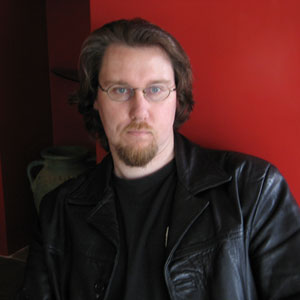
ScaryMinds - What is the hardest part of being on the Brimstone team and how much of your time does Australia's premier speculative
publisher take?
Shane - Time is always a critical factor - or more precisely, my lack thereof. Money, too. If it were up to me, I'd have
Brimstone Press producing 20 books a year, but time and money stop my grand plans every time! Well, that and Angela reining me in. She's the boss
when it comes to Brimstone's books, and she has a much more grounded approach than I do, which has worked well for us.
When I was doing Black magazine, I was effectively working 18-hour days, 7 days a week. It was that much of a pressure to get it all done.
The only time off was to sleep, and on the days when the magazine had to go to the printer, I sometimes worked through the night to meet the deadline.
They were rough times, and I don't want to return to them unless we change our approach, which is partly why Black is taking so long to return
in any format. Angela and I would dearly love to see it succeed, but we want to learn from our mistakes and do it properly, without the unnecessary
stress.
ScaryMinds - You are as well known for your non-fiction as your fiction, what differences do you find between writing a
fiction piece and an article?
Shane - In a lot of ways, writing non-fiction is easier. The largest creative variable is coming up with an angle for the
article. The rest is pretty formulaic. I've been working in my current day job as a magazine editor and journalist for close to four years now, so
writing non-fiction news and features is bread and butter for me. I still anguish over the fiction, though, because it is much more personal and
representative of me, not the publication I write for.
I find it easy to create a narrative thread for non-fiction. It's often a case of matching good quotes from interviewees and threading in some
joining statements to nudge the reader in a certain direction. Fiction, on the other hand, is often a blank slate. Everything from world-building,
character motivations and development, plots and sub-plots, and even style must be conceived and enacted. For me, the two are worlds apart, but
fiction is my first love.
ScaryMinds would like to once again thank Shane Jiraiya Cummings for sparing us some of his valuable time to answer the above question. We look
forward to reading future stories and novels from the Author.

Internet References for Shane Jiraiya Cummings
Shane Jiraiya Cummings - Shane's official home site. All the information you ever wanted to know about the Author, and as an added bonus free online
stories.
Smoke and Mirrors - Shane's online blog.
AHWA Page - Shane's Australian Horror Writers Association page.
Brimstone Press - Australia's leading small press site
Black Magazine - Australian Dark Culture magazine









 I've always allowed my stories to find their own natural length. Some started grand but ended up as flash, whereas others were written to a brief but
ballooned out from there. A good example is my novella "Requiem for the Burning God" in David Conyers' upcoming anthology Cthulhu's Dark Cults. It was
meant to be a short story of 5000 words, but 18,000 words and several months later, the story became a mini-epic. Ideas dictate the size of a story,
and the more experienced a writer is, the better they will be at matching their ideas with projected story lengths. I think I'm getting there!
I've always allowed my stories to find their own natural length. Some started grand but ended up as flash, whereas others were written to a brief but
ballooned out from there. A good example is my novella "Requiem for the Burning God" in David Conyers' upcoming anthology Cthulhu's Dark Cults. It was
meant to be a short story of 5000 words, but 18,000 words and several months later, the story became a mini-epic. Ideas dictate the size of a story,
and the more experienced a writer is, the better they will be at matching their ideas with projected story lengths. I think I'm getting there!
